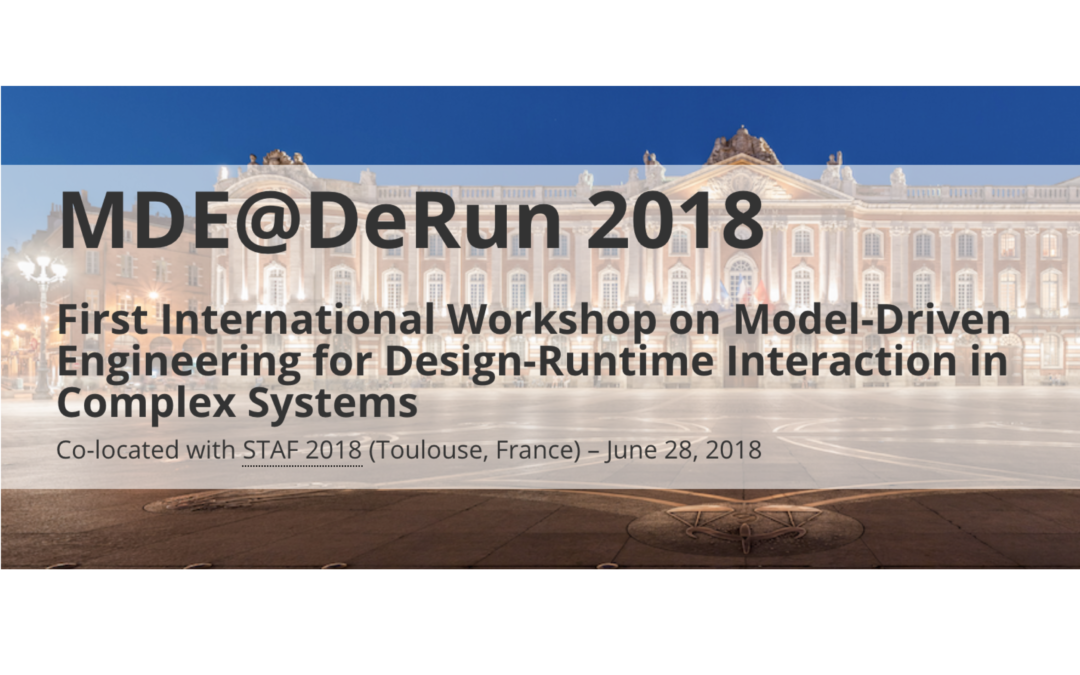The first Workshop on Model-Driven Engineering for Design-Runtime Interaction in Complex Systems (MDE@DeRun 2018) took place during the STAF 2018 week in Toulouse, France. The workshop report paper is “Model-Driven Engineering for Design-Runtime Interaction in Complex Systems: Scientific Challenges and Roadmap” (corresponding slides are also freely available from Slideshare). It explains the main objectives, content, and results of the event. Based on these, the report paper also proposes initial directions to explore further research in the workshop area.
Introduction
Complex systems are now predominant in several domains such as automotive, health-care, aerospace, industrial control, and automation. Such systems call for modern practices, such as Model-Driven Engineering (MDE), to tackle advances in productivity and quality of these Cyber-Physical Systems (CPSs). However, the proposed solutions need to be further developed to scale up for real-life industrial projects and to provide significant benefits at execution time.
To this intent, one of the major challenges is to work on achieving a more efficient integration between the design and runtime aspects of the concerned systems. The system behavior at runtime has to be better matched with the original system design to be able to understand critical situations that may occur. And this is also true for corresponding potential failures in design. Some methods and tools already exist for monitoring system execution and performing measurements of runtime properties.
However, many of them do not rely on models and, usually, do not allow a relevant integration with (and/or a traceability back to) design models. Such a feedback loop from runtime is highly relevant at design time, the most suitable level for system engineers to analyze and take impactful decisions accordingly. It might also be useful to let the final users have some sort of control and manipulation possibilities over elements they would not be able to access otherwise. This last benefit implies that the models at runtime might be quite different from those at design time. This is especially true in terms of programming/engineering background.
Topics
The potentially relevant topics notably include:
- Model-based techniques, methods, and tools allowing any interaction between design time and runtime, possibly resulting from heterogeneous engineering practices.
- Model-based techniques, methods, and tools for inferring design deviations and identifying affected elements over a possibly large spectrum of runtime system configurations or conditions.
- Methods and techniques allowing to practically integrate, possibly in different ways, any feedback collected at runtime into design level models.
- Integrated model-based methods and techniques for runtime analysis and design artifacts input collection, e.g. based on probes injection to some runtime artifacts.
- Validation and verification mechanisms for linking results of runtime analysis, e.g. from execution traces, with design models expressing systems’ both functional and non-functional requirements.
- (Industrial) case studies, experience reports, literature reviews or visionary positions related to any of the previously mentioned topics.
Contributions
Five papers have finally been accepted and presented during the workshop.
- Aliya Hussain, Saurabh Tiwari, Jagadish Suryadevara and Eduard Enoiu: From Modeling to Test Case Generation in the Industrial Embedded System Domain
- Saurabh Tiwari, Emina Smajlovic, Amina Krekic, and Jagadish Suryadevara: A System Modeling Approach to Enhance Functional and SoftwareDevelopment
- Daniel Zimmermann: Automated Consistency Preservation in Electronics Development of Cyber-Physical System
- Valentin Besnard, Matthias Brun, Frederic Jouault, Ciprian Teodorov, and Philippe Dhaussy: Embedded UML Model Execution to Bridge the Gap Between Design and Runtime
- Andreas Kastner, Martin Gogolla, Khanh-Hoang Doan and Nisha Desai: Sketching a Model-Based Technique for Integrated Design and RunTime Description
Challenges and Roadmap
Although many contributions could be achieved in the last decade in the MDE community, there are still several open challenges towards a complete and relevant integration between runtime and design aspects in complex systems. Firstly, explicit correspondences and/or traceability links are needed between runtime and design models. Secondly, a better understanding of the nature of the available runtime information (and its possible impacts on the design information) is required. Thirdly, the objectives and benefits of leveraging such correspondences and information need to be defined. The report presents a set of challenges that can be used as a research roadmap.
Conclusion
This report paper summarized the main objectives and contributions of this first edition. Furthermore, it discussed and proposed some first directions for further research in this area, which we plan to explore in the future in our respective works. We hope to be able to capitalize on the success of this initial edition of the MDE@DeRun workshop in order to organize the second edition of this event next year.
Sources
Related posts
- Foundations for Model Management and Traceability
- Towards Scalable Model Views on Heterogeneous Model Resources
Hugo Bruneliere, Romina Eramo, Abel Gomez

